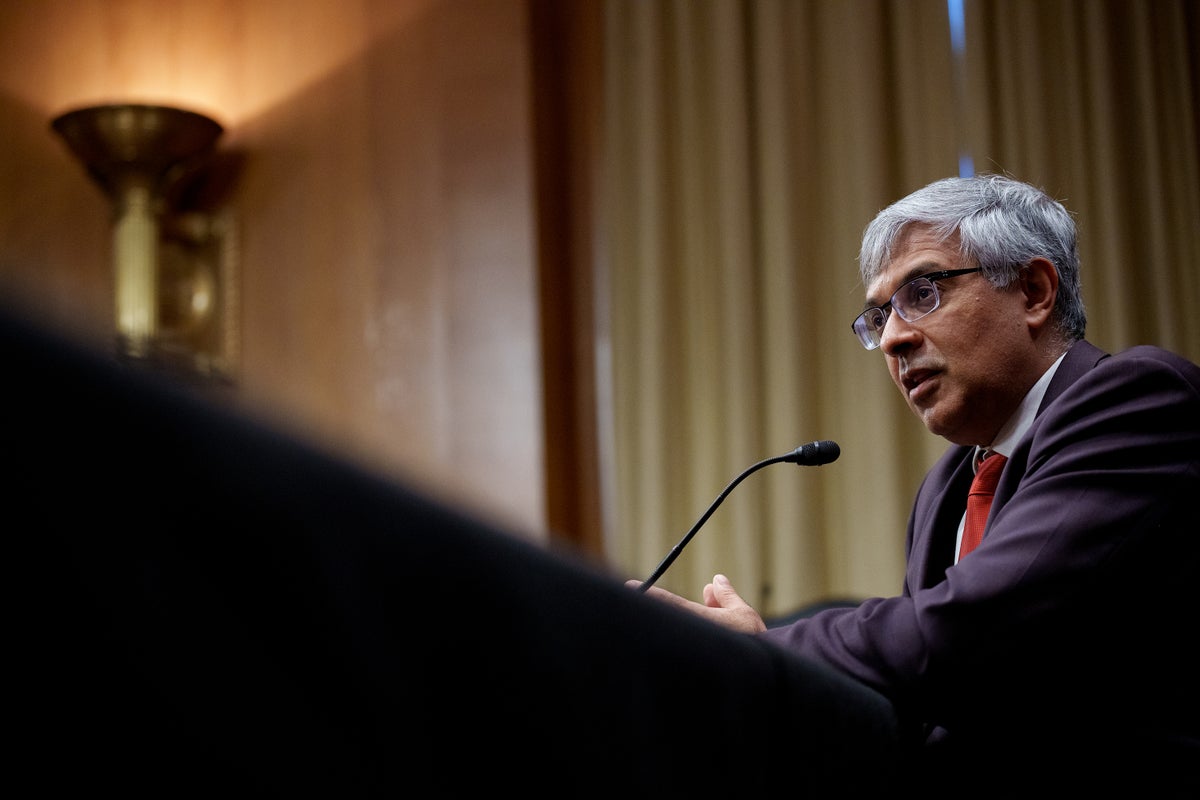RFK Jr.’s critics: 24 percent HHS staffing cuts risk 'manmade disaster'
The Trump administration announced plans Thursday to get rid of roughly a quarter of staffers at the Department of Health and Human Services (HHS), prompting a flurry of warnings from Democrats, former officials and policy experts over the potential consequences for the health of Americans. In a press release Thursday morning, the HHS said it...

The Trump administration announced plans Thursday to get rid of roughly a quarter of staffers at the Department of Health and Human Services (HHS), prompting a flurry of warnings from Democrats, former officials and policy experts over the potential consequences for the health of Americans.
In a press release Thursday morning, the HHS said it would be reorganizing the department and cutting about 10,000 jobs in the process through layoffs. The department will seek to cut an additional 10,000 employees through buyouts, early retirement and the administration’s “Fork in the Road” offer.
Removing 20,000 employees from the 82,000 HHS workforce represents a reduction of about 24 percent.
In an email to the American Federation of Government Employees union seen by The Hill, a representative from the human resources office said the workforce reduction would primarily affect employees in “administrative positions including human resources, information technology, procurement, and finance.”
“We aren’t just reducing bureaucratic sprawl. We are realigning the organization with its core mission and our new priorities in reversing the chronic disease epidemic,” HHS Secretary Robert F. Kennedy Jr. said in a statement. On social platform X, Kennedy acknowledged “this will be a painful period for HHS.”
Democratic lawmakers in both the House and Senate were swift in their condemnation of the announcement.
Sen. Patty Murray (D-Wash.) held a press briefing Thursday afternoon along with fellow Democratic Sens. Tammy Baldwin (Wis.) and Ed Markey (Mass.) responding to the planned layoffs.
“Today's announcement is not just a restructuring of the Department of Health and Human Services. It is a catastrophe for the health care of every American,” Markey said.
Rep. Diana DeGette (D-Colo.), ranking member of the House Energy & Commerce Health subcommittee, and Rep. Frank Pallone Jr. (D-N.J.) called on Republicans to prevent the “devastating” cuts.
“It’s beyond time for Republicans in Congress to hold this Administration accountable for the consequences of these short-sighted actions. Republicans have a responsibility to help us stop these catastrophic cuts from going into effect,” they said in a joint statement.
“We call on Chairman [Brett] Guthrie [R-Ky.] to hold a hearing on these cuts immediately. There is zero sense in having a routine hearing on user fees next week before understanding the Trump administration’s plan to gut the FDA by cutting 3,500 public servants.”
However, Guthrie and Buddy Carter (Ga.), chairman of the Subcommittee on Health, welcomed the news in a joint statement.
“For decades, HHS and its sub-agencies have grown significantly, creating redundancies and—in some cases—conflicting objectives. It is critical that the department is in a position to accomplish its core and essential mission to support all Americans,” they said. “We look forward to working with Secretary Kennedy to protect patients, support innovations, and improve the health and wellbeing of the American people.”
Murray, who sits on the Senate health committee, called it a “great day for snake oil.”
“Do you know what Trump and RFK Jr. are doing about the measles outbreak? They are ripping away funding Congress already provided to respond to the outbreaks. They're stopping public health work in its tracks, even as this outbreak is threatening to spiral out of control. What are they doing about the opioid crisis or maternal death rates or bird flu for that matter? More cuts and don't forget mass firings,” Murray said.
Baldwin warned of the impact these mass firings would have on the U.S.’s research capability, recounting a recent meeting she had with the son of a man who has amyotrophic lateral sclerosis (ALS), also known as Lou Gehrig’s disease.
“Dewey begged us to protect the lifesaving research being done at the NIH so his dad could see him walk across that stage and get his diploma,” said Baldwin. “I say this because when we talk about staffing cuts at our nation's health department, we aren't just talking about some imaginary person sitting around pushing papers. We are talking about people who support lifesaving research to find cures to ALS or Alzheimer's disease or cancer.”
Former Biden administration health officials also spoke out forcefully against the cuts.
“It’s hard to make sense of the HHS cuts announced this morning,” former HHS Secretary Xavier Becerra said in a statement on the social media platform X. “Who’s going to inspect our nursing homes? Who’s going to inspect for lead those imported toys that our kids put in their mouths?”
“This has the makings of a manmade disaster,” he added. “Downgrading services for our elderly and our disabled, downgrading services for our mental health, downgrading our strategic preparedness and response capabilities – how can that be good for the health of any American?”
Chiquita Brooks-LaSure, former administrator at the Centers for Medicare and Medicaid, cautioned that any cuts to health agencies should be done with “incredible care and consideration.”
“When you take a wrecking ball to an agency like CMS, you’re taking a wrecking ball to the people who are out across the country ensuring our parents and grandparents can get safe, affordable care as they age. You’re taking a wrecking ball to cancer patients who need a new, innovative treatment to be covered. You’re taking a wrecking ball to mothers and newborns who are both at the most critical points of their lives,” Brooks-LaSure said in a statement.
Tom Frieden, who served as director of the Centers for Disease Control and Prevention under former President Obama, wrote on X, “Infectious diseases don’t occur in a vacuum, and chronic diseases play critical roles in how infectious diseases spread and how to control them. That’s why CDC’s mission is protecting Americans from health threats of ALL kinds.”
“It’s hard for many people to see the importance of what CDC does because when it succeeds, there isn’t an outbreak. Your neighbor doesn’t overdose. Your cousin stops smoking or your child doesn’t start. Your grandmother doesn’t develop cancer,” wrote Frieden.
“Cuts to this work would put us all at greater risk.”
Healthcare organizations and policy think tanks recognized the potential benefits of an organizational review, but were wary of the cuts.
Larry Levitt, executive vice president for health policy at the major health policy group KFF, said on X that this move was “not just a reorganization.”
“It's also a slashing of the federal workforce, which will ultimately affect government services and lead to delays in getting help for both the pubic and health care providers,” said Levitt.
“Large government agencies like HHS tend to sprawl over time, as offices and staff get added to respond to new priorities. There is a benefit to occasional reorganizations of HHS. But, this is also about big staff and program reductions,” he added.
“A lot of what HHS employees do is behind the scenes oversight, to prevent fraud and abuse and ensure health care programs provide the services promised. Reductions in the federal workforce could result in more wasteful spending down the road.”
Wayne A. I. Frederick, interim chief executive officer of the American Cancer Society and the American Cancer Society Cancer Action Network, acknowledged the Trump administration’s desire for improved efficiency but echoed calls for careful and considerate cuts.
He said the changes would “touch all points of the cancer continuum, from prevention to research, to treatment access and survivorship care, and could disrupt our nation’s ability to develop early detection tests and treatments for the more than 200 diseases we know as cancer.”
Stephen C. Jameson, president of the American Association of Immunologists, warned a major reduction at HHS would endanger the U.S.’s dominance in biomedical research.
“Diminishing NIH’s workforce undermines America’s leadership in science and technology and will have negative consequences for the economy. Every U.S. state benefits from NIH funding, which supported more than 400,000 jobs and generated close to $95 billion dollars in economic activity across the nation in fiscal year 2024,” Jameson said in a statement.
“This is not the time to decrease our support for research. As other countries ramp up investment, we risk falling behind.”











































































